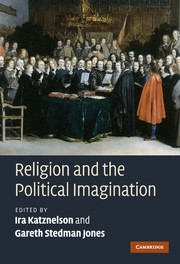Book contents
- Frontmatter
- Contents
- List of contributors
- Acknowledgements
- Introduction: multiple secularities
- 1 Secularisation: religion and the roots of innovation in the political sphere
- 2 Regarding toleration and liberalism: considerations from the Anglo-Jewish experience
- 3 The Enlightenment, the late eighteenth-century revolutions and their aftermath: the ‘secularising’ implications of Protestantism?
- 4 In the lands of the Ottomans: religion and politics
- 5 The Russian Orthodox Church and secularisation
- 6 The American experience of secularisation
- 7 French Catholic political thought from the deconfessionalisation of the state to the recognition of religious freedom
- 8 Religion and the origins of socialism
- 9 From 1848 to Christian Democracy
- 10 The disciplining of the religious conscience in nineteenth-century British politics
- 11 Colonial secularism and Islamism in North India: a relationship of creativity
- 12 The 1960s
- 13 Gendering secularisation: locating women in the transformation of British Christianity in the 1960s
- 14 Does constitutionalisation lead to secularisation?
- 15 Europe's uneasy marriage of secularism and Christianity since 1945 and the challenge of contemporary religious pluralism
- 16 On thick and thin religion: some critical reflections on secularisation theory
- Index
16 - On thick and thin religion: some critical reflections on secularisation theory
Published online by Cambridge University Press: 05 June 2012
- Frontmatter
- Contents
- List of contributors
- Acknowledgements
- Introduction: multiple secularities
- 1 Secularisation: religion and the roots of innovation in the political sphere
- 2 Regarding toleration and liberalism: considerations from the Anglo-Jewish experience
- 3 The Enlightenment, the late eighteenth-century revolutions and their aftermath: the ‘secularising’ implications of Protestantism?
- 4 In the lands of the Ottomans: religion and politics
- 5 The Russian Orthodox Church and secularisation
- 6 The American experience of secularisation
- 7 French Catholic political thought from the deconfessionalisation of the state to the recognition of religious freedom
- 8 Religion and the origins of socialism
- 9 From 1848 to Christian Democracy
- 10 The disciplining of the religious conscience in nineteenth-century British politics
- 11 Colonial secularism and Islamism in North India: a relationship of creativity
- 12 The 1960s
- 13 Gendering secularisation: locating women in the transformation of British Christianity in the 1960s
- 14 Does constitutionalisation lead to secularisation?
- 15 Europe's uneasy marriage of secularism and Christianity since 1945 and the challenge of contemporary religious pluralism
- 16 On thick and thin religion: some critical reflections on secularisation theory
- Index
Summary
Secularisation theory – analysis of the role of religion under modern conditions – has been thrown into confusion by some baffling historical developments. Writing about ‘secularisation’ as a subject involves a paradox: it pre-commits us to write about the ‘decline’ of religion, although the entire point of the analysis should be to ascertain whether religion has suffered a decline or not. Conceiving the subject that way presupposes an answer to a question still under analysis. History appeared to be obediently following the logic of rationalisation detected by modern social theory, until the revolution by Ayatollah Khomeini unreasonably upset its rhythms and confused its directions. After a time, it was clear that the Iranian Revolution was not an isolated incident, which could be treated as an anomaly. A revivalist Taliban successfully destroyed Afghanistan's modernist communist regime, supported by Soviet arms – though, in this startling achievement the US policies contributed more generously than is normally admitted. Western governments sought simply to use these medieval fanatics, incongruously placed in a modern world, for their own geopolitical strategy, and intended to offer them strictly temporary support. After their victory over communism, the fundamentalist army refused to melt into oblivion, and on the contrary, started spreading influence in surrounding regions. Even in the enlightened continent of Europe, where government policies implicitly assumed that immigrants, stepping on these enlightened shores, would be instantly converted to secular rationalism, surprising developments happened.
- Type
- Chapter
- Information
- Religion and the Political Imagination , pp. 336 - 355Publisher: Cambridge University PressPrint publication year: 2010
- 8
- Cited by

